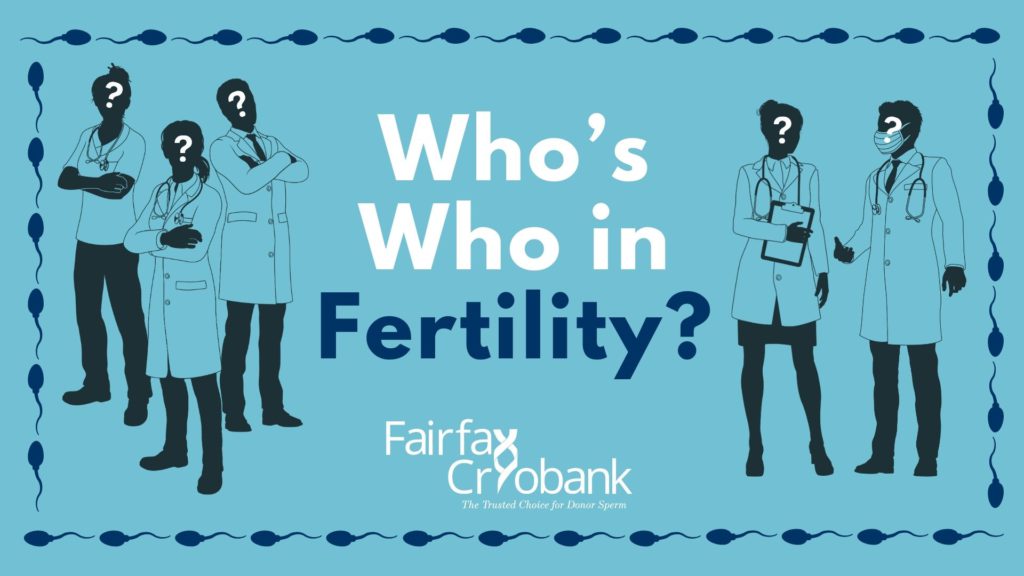Who’s Who in Fertility?

When pursuing fertility counseling or treatment to identify fertility challenges, it can often feel like you don’t know who’s who. The team is big and confusing, and it isn’t always clear who is in which role. As the person who will be pregnant, you want to be empowered with clear information and knowledge about everyone’s role and responsibilities so you’re clear on who to turn to and what they can do for you. So, let’s look at your roster.
Fertility Specialist
Your first point person—your quarterback—is your fertility specialist. This person is nearly always an MD and will likely be a reproductive endocrinologist (though sometimes they are an OB-GYN with specialized fertility training). Finding the right specialist for your situation can start with your own OB/GYN or nurse midwife, as they often have collaborative relationships with fertility centers in your area. You may want to contact a few for an initial consultation and decide based on how you feel about them and their recommendations. They can offer you substantial advice about when and how you’re most likely to find success. In many ART procedures, like egg retrieval for IVF/co-maternity, they (or their staff) will perform the procedure. If you have questions or concerns about anything ART or fertility-related, they must ask first.
OB-GYN or Midwife
Once you become pregnant, your care will shift to your OB-GYN (or your midwife if you choose midwifery care). Your fertility doctor is still on your team, but pressing questions or concerns about your pregnancy will be addressed to your OB-GYN/midwife, who you can think of as you and your baby’s pregnancy provider.
In choosing what kind of pregnancy provider to work with, it’s essential to consider your specific medical context (your fertility doctor is a great person to consult with on this choice and can offer you referrals to trusted providers). For healthy, low-risk pregnancies, midwifery care can offer a more holistic approach that values fewer interventions and can support homebirth if that is your preference. If you or your baby have any medical issues (or if you’re over 35 years old), the typical recommendation is to seek care from an OB-GYN equipped to handle any complications if they arise. If you know you or your baby are high-risk, working with an OB-GYN who is also a maternal-fetal medicine doctor (essentially a high-risk OB-GYN) is recommended.
No matter what type of provider you choose, they will be your point person throughout your pregnancy and labor, and they will be the person helping you as you deliver your baby.
Embryologist
If you use IVF to become pregnant, you’ll also have an embryologist who is not a doctor but a scientist specializing in managing eggs, sperm, and embryos. Once your eggs are retrieved, and your donor or partner’s sperm is collected, the embryologist will place them together in the lab, ensure that they are correctly incubated, and (if you opt for genetic testing) collect the sample needed to send to the testing laboratory. You may or may not have first-hand interaction with your embryologist but know that they are an essential part of the ART team.
Genetic Specialist
You may be referred to a genetic specialist if further testing on yourself, any embryos created, or an ongoing pregnancy is needed. If you’re using donor sperm, they will work with you to ensure you’ve been tested for carrier genes that your donor also carries, and they can perform any additional testing that you and your family want to have done.
Doula
Another person who may be a part of your fertility and pregnancy team is your doula. Not every birthing person opts to have a doula, but it is worth considering, as they can be tremendously supportive throughout pregnancy. A doula serves as a third party (outside your partnership) to offer support and education in pregnancy, labor preparation, and even infant care. They will also support you and your partner during labor and delivery.
Your Team
Getting pregnant with ART is a team effort, and feeling confident in every team member is essential. It can be challenging to feel like the “squeaky wheel,” especially with busy doctors, but remember that as the pregnant or trying-to-get pregnant person, you are the most important person in the room, and you deserve to have all your questions addressed. Enlist your partner, if you have one, to help you with lists of questions and concerns to bring to appointments. The biggest thing to remember is that the team is in place to support you—you’re the one doing the hard thing!
Be sure to explore our resources and blog page for all things donor sperm, single moms by choice, fertility, LGBTQ family-planning, and more!







